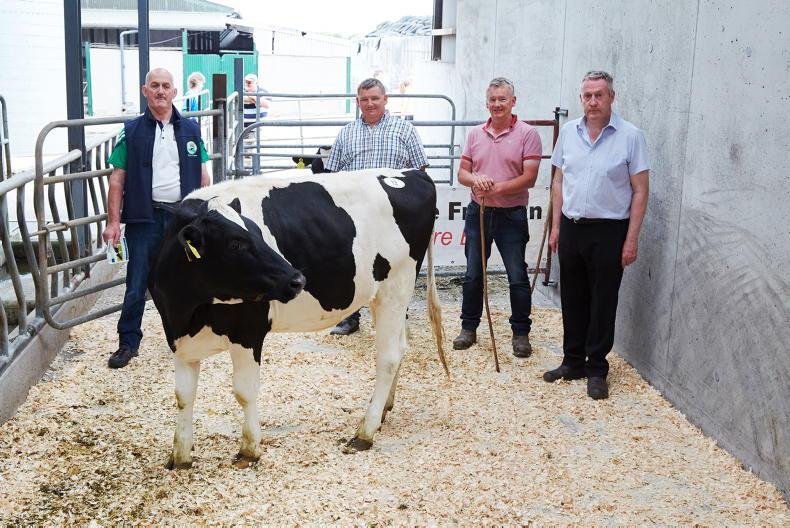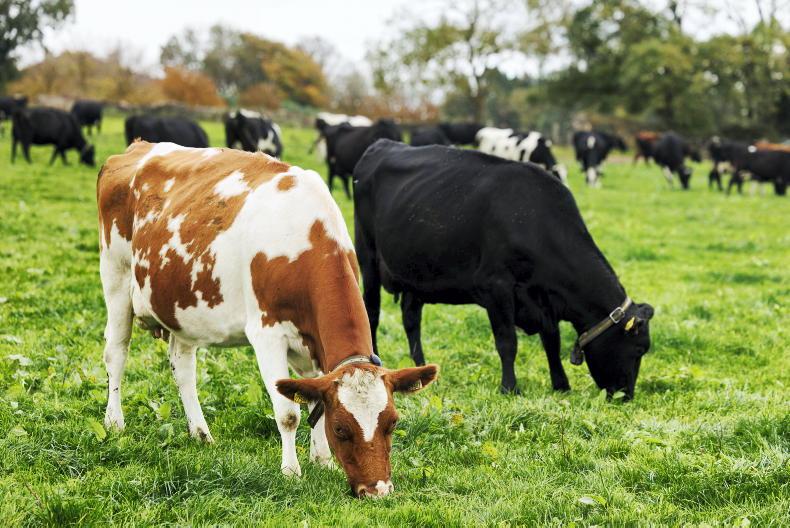COVID-19 has utterly changed our world in a remarkably short period of time. We’ve all had to adjust in our personal, work and organisational lives. One phrase that’s been heard repeatedly over the last few weeks is that “we’re all in this together”. Within agricultural communities that need for us to come together for the greater good was instinctive and captured in the great Irish tradition of the “meitheal”.
In recent years, that sense of togetherness has dimmed but it has been reignited with a vengeance during the last few weeks. There is now a great opportunity for coherent and collaborative actions among all of the relevant players in Irish agriculture from the farming organisations, the farming media, the Department of Agriculture and its agencies and the private sector.
Such collaborations have been powerful forces of change in the past. The contribution that is possible through these collaborations depends on joined-up thinking and acceptance of the value of diversity of approaches directed towards a common goal.
Hidden network of supports
Farming communities are in a better position than many of those in built-up environments to withstand the worst health impact of the virus. Many farmers are isolated physically but due to modern communications they are tapped into their families, friends and neighbours and can avail of community supports if needed. I’ve been struck by the often hidden network of support that exists in my own parish and I’m sure that it’s replicated across the country. The important issue is that farmers use these communication systems and are proactive when they need to reach out for help.
Teagasc, as an organisation, has had to greatly step up the scale and scope of our dissemination channels. We’ve probably accomplished more in two to three weeks to upgrade our digital presence than we might have done in one to two years in other circumstances. Teagasc and private advisory services are available in every location throughout the country to assist farmers who are concerned about different scheme deadlines and obligations and who require technical assistance. Our discussion groups are running smoothly using a variety of platforms that most of us hadn’t heard about up to a couple of weeks ago. We’re encouraging all farmers, irrespective of whether they are Teagasc clients, to use our Teagasc helpline or to contact our local offices when they need assistance. Contrary to some erroneous reports, advisers fully embraced this initiative and are working flat out to support our 45,000 clients.
With regards to the BPS in particular, we are eager to process as many of the applications as soon as possible so, if someone gets sick, we are at less risk of causing more stress in a month’s time.
For all of us, it is very difficult get the invisible virus out of our minds but farmers have the additional worries of who will keep their business going if they get sick or, how are they going to navigate the collapse in demand and prices that have occurred. Along with the IFA, ICMSA and FRS, Teagasc has set up a Farm Labour Register that, at a local level, encourages farmers and non-farmers to register their willingness to help out on a local farm in the event of a health breakdown. This is a modern example of the “meitheal” in action. We all hope that this contingency will never arise but the existence of the register hopefully will provide some peace of mind and allay anxiety. We’re asking all farming organisations to promote the register with their members.
We’re conscious of the challenges that the horticultural sector faces in dealing with an acute shortage of labour as the normal channels of access to foreign labour have been closed off. Our horticultural team is providing a constant flow of advisory support to the sector.
Foreign markets
Maintaining access to foreign markets is crucial. Demand has fallen, particularly in the food service sector, and prices have plummeted, especially for beef. And milk prices have also begun to fall. The ability of our co-ops to process milk at peak is a concern and Teagasc is planning how to support the industry should there be a problem.
The beef sector is now experiencing two exceptionally difficult years in a row. The problems are compounded by the loss of part-time off-farm employment in many farming households. Our advisers are strongly pushing the BEEP scheme, which will be an important source of scarce cash later in the year.
Teagasc will be emphasising over the next few weeks the need for farmers to reduce costs and thereby to minimise income and cashflow difficulties. Optimum grass utilisation will be essential and if farmers haven’t yet joined PastureBase Ireland (PBI), now is the time to do so. If there is a silver lining in the cloud it is that the use of PBI is well up on last year, with over 2,000 covers recorded to date.
All of our colleges are closed and part-time and distance-education classes have been suspended at our regional centres. But our teachers are flat out delivering learning material online and online examinations and assessments are being employed.
We’ll be challenged to maintain our infrastructure of research experiments intact during the lockdown phase. Research experiments are very expensive and typically take place over a period of four to five years. We are working to minimise that disruption while adhering to the public health guidelines. We are fortunate to have some of the best scientists that you could find anywhere employed in Teagasc. They’re also imbued with a huge sense of public spirit. That spirit was exemplified by the over 80 colleagues that have volunteered to do the lab analysis of the COVID-19 tests in collaboration with Enfer and the Department of Agriculture. Another group of my colleagues based at Teagasc Moorepark has collaborated in the production of the scarce reagents that are needed to carry out this analysis.
I’m conscious that without access to social media, we would have been unable to maintain our services at anything like their current level. But I’m also conscious that many farmers do not engage with social media.
They rely on getting their information in print form. We continue to post out Today’s Farm and our newsletters and this week’s special supplement in the Irish Farmers Journal will distil our key messages for these extraordinary times.
Read more
INHFA calls on suckler farmers to join BEEP-S scheme
Sucky calf scheme
COVID-19 has utterly changed our world in a remarkably short period of time. We’ve all had to adjust in our personal, work and organisational lives. One phrase that’s been heard repeatedly over the last few weeks is that “we’re all in this together”. Within agricultural communities that need for us to come together for the greater good was instinctive and captured in the great Irish tradition of the “meitheal”.
In recent years, that sense of togetherness has dimmed but it has been reignited with a vengeance during the last few weeks. There is now a great opportunity for coherent and collaborative actions among all of the relevant players in Irish agriculture from the farming organisations, the farming media, the Department of Agriculture and its agencies and the private sector.
Such collaborations have been powerful forces of change in the past. The contribution that is possible through these collaborations depends on joined-up thinking and acceptance of the value of diversity of approaches directed towards a common goal.
Hidden network of supports
Farming communities are in a better position than many of those in built-up environments to withstand the worst health impact of the virus. Many farmers are isolated physically but due to modern communications they are tapped into their families, friends and neighbours and can avail of community supports if needed. I’ve been struck by the often hidden network of support that exists in my own parish and I’m sure that it’s replicated across the country. The important issue is that farmers use these communication systems and are proactive when they need to reach out for help.
Teagasc, as an organisation, has had to greatly step up the scale and scope of our dissemination channels. We’ve probably accomplished more in two to three weeks to upgrade our digital presence than we might have done in one to two years in other circumstances. Teagasc and private advisory services are available in every location throughout the country to assist farmers who are concerned about different scheme deadlines and obligations and who require technical assistance. Our discussion groups are running smoothly using a variety of platforms that most of us hadn’t heard about up to a couple of weeks ago. We’re encouraging all farmers, irrespective of whether they are Teagasc clients, to use our Teagasc helpline or to contact our local offices when they need assistance. Contrary to some erroneous reports, advisers fully embraced this initiative and are working flat out to support our 45,000 clients.
With regards to the BPS in particular, we are eager to process as many of the applications as soon as possible so, if someone gets sick, we are at less risk of causing more stress in a month’s time.
For all of us, it is very difficult get the invisible virus out of our minds but farmers have the additional worries of who will keep their business going if they get sick or, how are they going to navigate the collapse in demand and prices that have occurred. Along with the IFA, ICMSA and FRS, Teagasc has set up a Farm Labour Register that, at a local level, encourages farmers and non-farmers to register their willingness to help out on a local farm in the event of a health breakdown. This is a modern example of the “meitheal” in action. We all hope that this contingency will never arise but the existence of the register hopefully will provide some peace of mind and allay anxiety. We’re asking all farming organisations to promote the register with their members.
We’re conscious of the challenges that the horticultural sector faces in dealing with an acute shortage of labour as the normal channels of access to foreign labour have been closed off. Our horticultural team is providing a constant flow of advisory support to the sector.
Foreign markets
Maintaining access to foreign markets is crucial. Demand has fallen, particularly in the food service sector, and prices have plummeted, especially for beef. And milk prices have also begun to fall. The ability of our co-ops to process milk at peak is a concern and Teagasc is planning how to support the industry should there be a problem.
The beef sector is now experiencing two exceptionally difficult years in a row. The problems are compounded by the loss of part-time off-farm employment in many farming households. Our advisers are strongly pushing the BEEP scheme, which will be an important source of scarce cash later in the year.
Teagasc will be emphasising over the next few weeks the need for farmers to reduce costs and thereby to minimise income and cashflow difficulties. Optimum grass utilisation will be essential and if farmers haven’t yet joined PastureBase Ireland (PBI), now is the time to do so. If there is a silver lining in the cloud it is that the use of PBI is well up on last year, with over 2,000 covers recorded to date.
All of our colleges are closed and part-time and distance-education classes have been suspended at our regional centres. But our teachers are flat out delivering learning material online and online examinations and assessments are being employed.
We’ll be challenged to maintain our infrastructure of research experiments intact during the lockdown phase. Research experiments are very expensive and typically take place over a period of four to five years. We are working to minimise that disruption while adhering to the public health guidelines. We are fortunate to have some of the best scientists that you could find anywhere employed in Teagasc. They’re also imbued with a huge sense of public spirit. That spirit was exemplified by the over 80 colleagues that have volunteered to do the lab analysis of the COVID-19 tests in collaboration with Enfer and the Department of Agriculture. Another group of my colleagues based at Teagasc Moorepark has collaborated in the production of the scarce reagents that are needed to carry out this analysis.
I’m conscious that without access to social media, we would have been unable to maintain our services at anything like their current level. But I’m also conscious that many farmers do not engage with social media.
They rely on getting their information in print form. We continue to post out Today’s Farm and our newsletters and this week’s special supplement in the Irish Farmers Journal will distil our key messages for these extraordinary times.
Read more
INHFA calls on suckler farmers to join BEEP-S scheme
Sucky calf scheme









SHARING OPTIONS